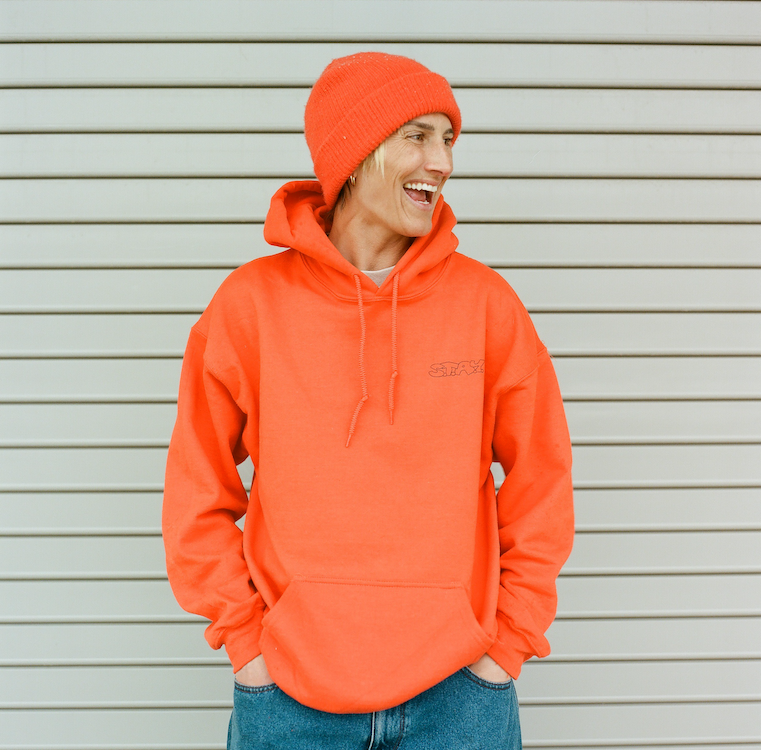
Shredding Stigma
Pro snowboarder turned Westminster grad student brings mental-health wellness to the action-sports community
by Autumn Thatcher (MSCMHC '15)
Desiree Melancon says the path to becoming a professional snowboarder has been convoluted and complicated—not just the journey that begins with picking up a snowboard and grinding day in and out to evolve into one of the most celebrated street riders on a board, but the personal journey. The one that ebbs and flows from within, growing into lived experiences of joy and pain, celebration and grief. The being.
A professional snowboarder for over 20 years, Desiree is sponsored by industry names like Volcom and Salomon. She is an incredible fine artist and has created designs that can be found on snowboards and winter apparel. But things aren’t always as they seem, and even the superhuman talents of professional athletes do not safeguard them from the realities of mental- health challenges or feelings of isolation. They are, after all, still human.
“When you’re a professional athlete, there’s an unspoken expectation to be stoked all the time and project your life in a positive and exciting way,” Desiree says. “One of the main issues is that addressing and seeking help for mental health issues are stigmatized in our space—but this is also a global issue.”
Desiree says that she had a lot of exposure to grief at an early age. As she grew older, she struggled with knowing how to manage that grief, constantly questioning how to heal and feeling as though she could not find the answers she desperately sought.
“I feel like my entire journey has been micromanagement of how to exist in the world,” Desiree says. “Once I ended up finding snowboarding, that was a coping tool that I needed. It saved my life, but it also has its downsides.”
Becoming a professional snowboarder has taken Desiree around the world and exposed her to what she describes as formative moments that influenced her to pursue higher education and earn two bachelor of science degrees at Portland State University: one in social science and one in art practices. She also discovered that, despite her experience of existing under the patriarchy of a male-dominated sport, she was not alone in the struggles she faced with her mental health.
“We have lost members of our community to suicide, and I had attempted in the past. There just wasn’t anything being done or available,” Desiree says. “There wasn’t space to communicate about it or see where to look for resources—or just ways in which friends could show up for each other.”
Three years ago, Desiree created that space.
It began with an acronym. Taking inspiration from programs like DARE (Drug Abuse Resistance Education) and POW (Protect Our Winters), Desiree landed on S.T.A.Y. (Somebody’s Thinking About You).
“The general purpose was to fill the gap that was missing within the action-sports community due to stigmas. Seeking help isn’t normal, and talking about feelings isn’t an option,” Desiree says. “Our purpose was to make a place where people could safely communicate about it, with the underlying mission being to combat the stigma within the landscape.”
S.T.A.Y. is very much a grassroots initiative. Founded by Desiree with the help of multiple contributors, the organization launched into existence in snowboarding magazines by running ads that used art to raise awareness of the new national mental health crisis number, 988. The organization has also partnered with therapists and has provided free group counseling in Salt Lake City. Fast-forward to the present day, and S.T.A.Y. hosts suicide-prevention trainings and is working on creating programming for group retreats.
“The information is very valid, very real, and presented in a digestible way,” Desiree says.
And it’s free, which speaks to the organization’s goal of combating the inherent privilege associated with accessing resources for mental-health wellness.
A well-versed marketer, Desiree found that the hard work in forming S.T.A.Y. was paying off in that the organization was getting noticed—and action-sports athletes were hungry for the safe space the organization offered. However, there was a lot of terrain to cover in the nonprofit landscape.
“Through the journey of making this thing grow, I realized I needed to have the educational backing to be able to effectively run the nonprofit,” Desiree says.
In the fall of 2022, Desiree began Westminster’s Master of Science in Clinical Mental Health Counseling program.
“That first year alone allowed us to make a plan and create a path for ways the nonprofit can effectively serve our community and grow,” Desiree says. “The mental health industry is complicated, so removing the veil has been extremely helpful.”
With one year of graduate school under her belt and plenty of ambition, Desiree hopes to receive more funding and overall support to make mental health resources more accessible—and to break down stigmas along the way.
“It begins with conversations,” she says. “The most important thing is to move beyond the stigma of not asking for help: we have to learn that it's okay to not be okay. Do a mini check-in, and then check in with your friends. Show your friends you love them.”
Follow S.T.A.Y. on Instagram: @somebodysthinkingaboutyou
Learn more: somebodysthinkingaboutyou.org
About the Westminster Review
The Westminster Review is Westminster University’s bi-annual alumni magazine that is distributed to alumni and community members. Each issue aims to keep alumni updated on campus current events and highlights the accomplishments of current students, professors, and Westminster alum.
GET THE REVIEW IN PRINT Share Your Story Idea READ MORE WESTMINSTER STORIES
